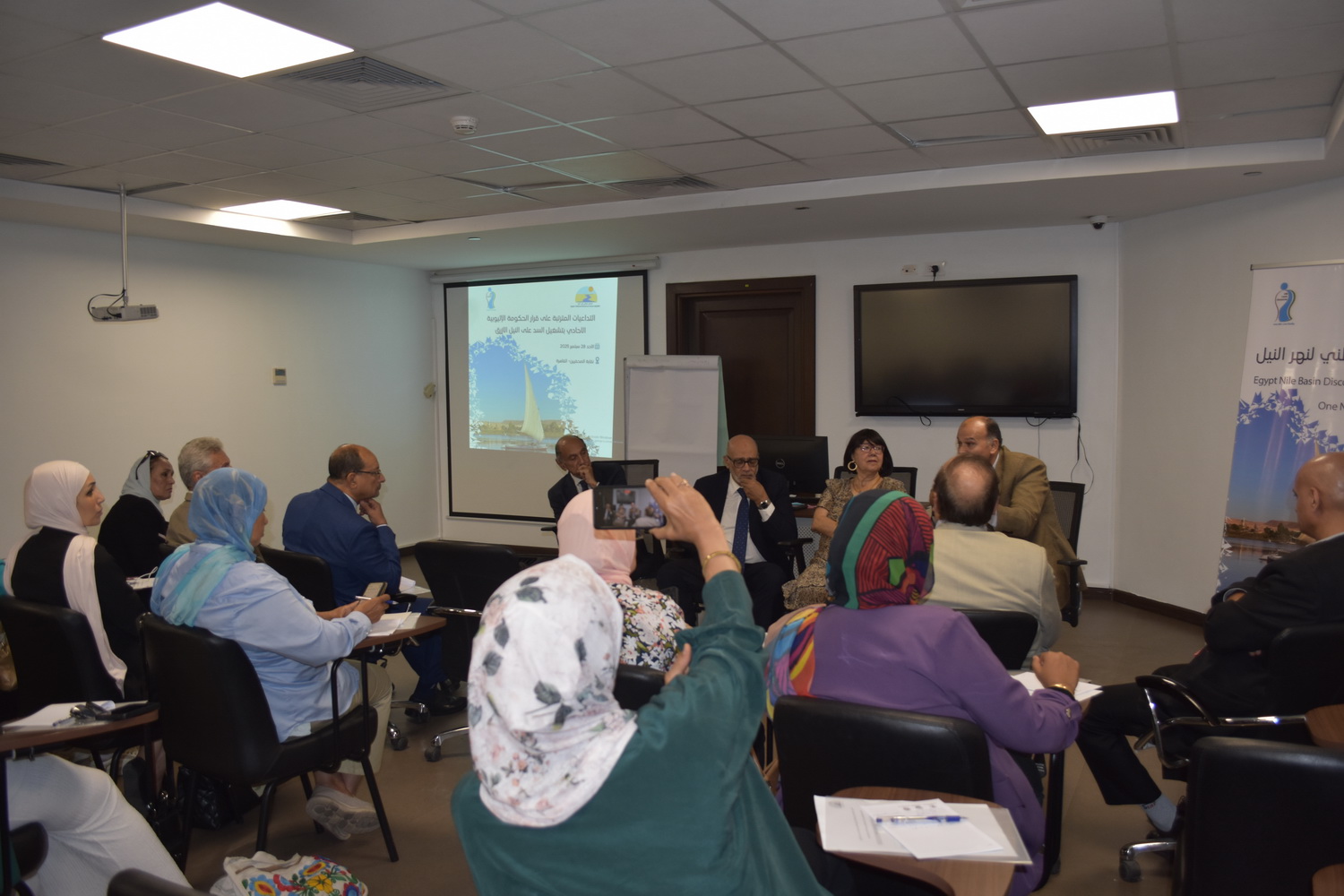“One Nile – One Family” The Message of Egyptian Civil Society to the World on the International Day of Rivers
Experts: Ethiopia is Violating the Principles of Joint Management of the Nile’s Resources
Unilateral Operation of the Ethiopian Dam on the Blue Nile Threatens the Water Security of Egypt and Sudan
Defending Egypt’s Rights to the Nile is a “Battle for Survival”. The Policy of Imposed Reality Will not Lead to Development
In a symbolic scene filled with significance, representatives of civil society organizations, members of the Egypt – Nile Discourse Forum (Eg-NDF), gathered at the Press Syndicate Hall in Cairo to sound an alarm on the International Day of Rivers. They emphasized that the issue of the Nile River is no longer merely a matter of negotiations between governments, but a battle of awareness and existence shared by peoples before states, in defense of the right to life, water and sustainable development.
The statement issued by the Egypt – Nile Discourse Forum was explicit in tone: Addis Ababa has taken a “unilateral step” by deciding to operate the Grand Ethiopian Renaissance Dam (GERD), without coordination or consent from the downstream countries, in clear violation of international law, the 2015 Declaration of Principles, and the Presidential Statement of the UN Security Council issued in September 2021. This behavior, as described by Egyptian civil society, reflects an insistence on the policy of imposing a fait accompli and undermines the foundations of regional cooperation established by the Nile Basin Initiative over two decades ago, an initiative built upon the principles of participation, transparency and equitable utilization of shared resources.
Dr. Emad Adly, Chairperson of the Egypt – Nile Discourse Forum, recalled during the symposium a memorable moment from March 2011, when representatives of the Nile Basin peoples raised their hands together under the slogan “One River, One Family.” He stressed that Egypt does not oppose development in Ethiopia or any other Nile Basin country, but it firmly rejects any development that comes at the expense of Egypt’s and Sudan’s water security. He affirmed that technical and technological alternatives could have enabled Ethiopia to achieve its electricity-generation goals without infringing on others’ rights.
Warnings extended beyond political and legal aspects to include precise technical assessments of dam-operation scenarios. Dr. Tarek Wafik, former Minister of Housing, cautioned that the risks to Egypt and Sudan are not hypothetical but certain, whether during flood years when massive volumes of water are retained or during drought years when stored water becomes a tool of pressure.
Meanwhile, Dr. Yousry Khafagy, water-resources expert and former spokesperson of the Ministry of Irrigation, explained the mechanism of power generation at the dam, noting that the same goal could have been achieved with a smaller storage capacity that would not threaten river flows. He also revealed Ethiopia’s plans to construct between five and nine additional dams on the Blue Nile, creating an enormous storage capacity that could suffocate Egypt during dry periods—what he described as the most serious strategic threat.
The symposium further addressed the environmental and hydrological impacts of Ethiopia’s unilateral operation of the dam. Experts warned of the degradation of ecosystems and agricultural lands, rising desertification rates, declining food production and the potential collapse of entire livelihoods for millions of farmers along the riverbanks.
Dr. Hala Yousry, professor of sociology, linked environmental and social dimensions, stressed that water security is not merely a resource issue but one of social and political stability. She praised the role of the Egypt – Nile Discourse Forum in raising public awareness. She warned against Ethiopia’s attempts to mislead the international community with claims of “absolute sovereignty” over the Blue Nile, a deliberate conflation between national sovereignty and transboundary resources.
Recognizing the importance of soft power, the forum announced the formation of a specialized media committee to serve as an advocacy arm supporting Egypt’s official position. The symposium also recommended strengthening cooperation between the Egypt – Nile Discourse Forum and the Ministries of Foreign Affairs and Water Resources & Irrigation so that civil society can act as a complementary front to diplomatic efforts, fostering communication channels with counterparts across the basin countries.
In its closing statement, the forum reaffirmed that “Egypt reserves its full right to take all measures guaranteed by international law and the UN Charter to protect its water security.” Yet the most powerful message came from civil society itself: “The Nile does not belong to one nation; it is a lifeline for ten countries and their peoples. Any attempt to exploit it for narrow political interests will push the region toward unprecedented existential threats.”
Issuing its statement from the Press Syndicate on the International Day of Rivers, the Egypt – Nile Discourse Forum reiterated that the concept of “One Nile – One Family” is not just a slogan but an open invitation to return to the table of cooperation, where there are no winners or losers, only partners who safeguard rights and build a shared future for all Nile Basin peoples along the banks of a river that has always been, and must remain, a symbol of unity rather than division. The forum concluded that defending Egypt’s rights to the Nile is indeed “a battle for survival,” and that the solution will never be found in imposing realities but in achieving fair consensus that ensures development for all.

